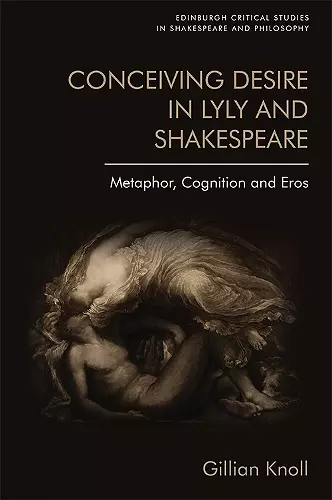Conceiving Desire in Lyly and Shakespeare
Metaphor, Cognition and Eros
Format:Hardback
Publisher:Edinburgh University Press
Published:3rd Mar '20
Should be back in stock very soon

Explores the role of the mind in creating erotic experience on the early modern stage Advances a new critical methodology that credits the role of cognition in the experience of erotic desire, and pleasure itselfExplores the philosophical underpinnings of erotic metaphors, drawing from ancient, early modern, and contemporary thinkers such as Aristotle, Giordano Bruno, Gaston Bachelard, Emmanuel Levinas, Kenneth Burke, George Lakoff, and Mark TurnerIlluminates the dramatic vitality of philosophical and contemplative erotic speechProvides the first full-length study that pairs John Lyly’s and William Shakespeare’s drama, uncovering new forms of intimacy in their plays To ‘conceive’ desire is to acknowledge the generative potential of the erotic imagination, its capacity to impart form and make meaning out of the most elusive experiences. Drawing from cognitive theories about the metaphorical nature of thought, Gillian Knoll traces the contours of three conceptual metaphors – motion, space and creativity – that shape desire in plays by John Lyly and William Shakespeare. Metaphors, she argues, do more than narrate or express eros; they constitute erotic experience for Lyly’s and Shakespeare’s characters.
The first book to pair Shakespeare and Lyly, Gillian Knoll’s Conceiving Desire in Lyly and Shakespeare is a brilliant, wide-ranging application of cognitive and conceptual metaphor theory to show how cognition and eros come together – thrillingly, threateningly, creatively – in the experience of dramatic characters such as Lyly’s Endymion and Campaspe, or Shakespeare’s Othello, Kate and Petruchio, and Antony and Cleopatra. Using three domain metaphors of motion, space and creativity, and the insights of philosophers from Aristotle to Mark Lakoff and Gaston Bachelard, Knoll explores the capacity of erotic experience to "make love" for the cognitively aware selves caught in its toils. Reading Knoll is to find oneself in the presence of genuinely new interpretations not only of little-known plays like Lyly’s Endymion but also Shakespeare’s best-known comedies and tragedies. I will not soon forget Knoll’s dazzling exposition of Endymion’s undying love for the immensity of the moon. * Gail Kern Paster, Folger Shakespeare Library *
One of the joys of this book is that its readings are seemingly indefatigable. -- Joseph Gamble, University of Toledo * Modern Philology *
ISBN: 9781474428521
Dimensions: unknown
Weight: 584g
288 pages